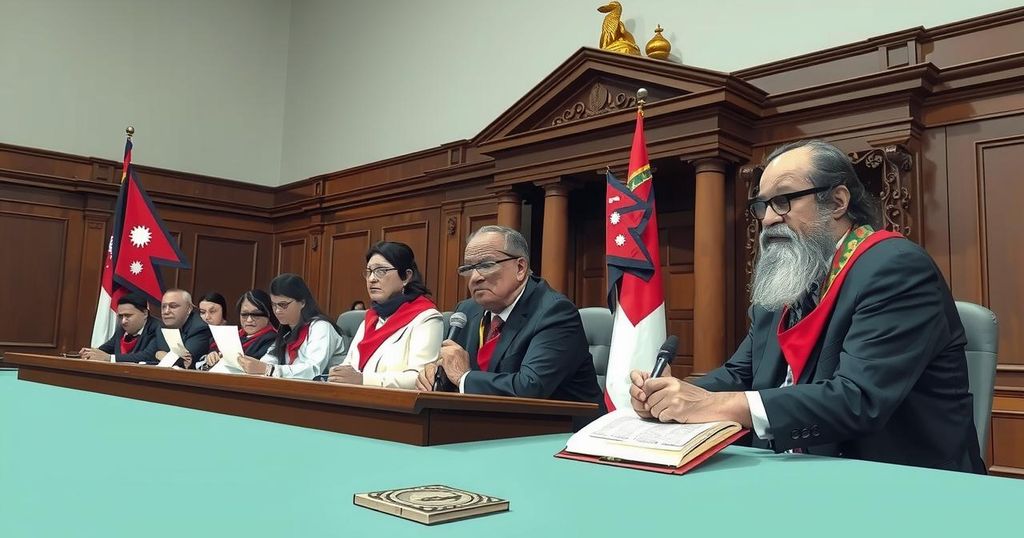Climate change
AR, ARZU RANA DEUBA, ASIA, CLIMATE CHANGE, DEUBA, EUROPE, HAGUE, HUMAN RIGHTS, ICJ, INTERNATIONAL COURT OF JUSTICE, LEGAL SYSTEM, NEPAL, NETHERLANDS, OCEANIA, PACIFIC, PACIFIC ISLAND, PACIFIC ISLAND STUDENTS FIGHTING CLIMATE CHANGE, PARIS AGREEMENT, STUDENTS FIGHTING, THE HAGUE, VANUATU
Fatima Khan
0 Comments
Nepal Advocates for Climate Justice at the International Court of Justice
At the International Court of Justice, Nepal called for climate justice, highlighting the disproportionate suffering caused by climate change. Foreign Minister Arzu Rana Deuba stated that Nepal faces severe environmental threats due to global warming, despite contributing little to the problem. The court’s hearings involve 97 states and aim to clarify international obligations regarding climate change, with a focus on accountability for developed nations and the needs of vulnerable countries.
At the International Court of Justice (ICJ) in The Hague, Nepal has made a poignant appeal for climate justice, illuminating the severe implications of climate change on its people. During the court’s public hearings on the ‘Obligations of States in respect of Climate Change,’ Nepal’s Foreign Minister Arzu Rana Deuba articulated the nation’s grievances, emphasizing that the adverse effects of global warming significantly threaten Nepal’s fragile environment, particularly its glaciers and mountainous regions.
Minister Deuba conveyed that Nepal, despite being one of the countries most affected by climate change, has contributed minimally to its causes. He expressed, “We are having to bear the brunt of the impacts of climate change in a disproportionate manner. In fact, we are paying for a bad ‘karma’ we did not create,” indicating that Nepal suffers due to actions of higher-emitting nations.
The presentation underscored the dire phenomena witnessed in Nepal, such as the rapid melting of glaciers, increased frequency of extreme weather events, and extensive economic destruction from natural disasters. Minister Deuba remarked on how these issues have devastated agricultural production and local communities. He also emphasized that, while Nepal contributes to biodiversity and climate balance, its unique vulnerabilities stem from its geography and socio-economic status.
Moreover, the Foreign Minister highlighted how vulnerabilities hinder the capacity of many affected states to fulfill international human rights obligations concerning climate change. Deuba pointed to the significant role of developed nations in this scenario, calling for recognition of historical emissions and the need for accountability towards affected countries.
This case represents the most extensive proceedings ever witnessed at the ICJ, with 97 States and 11 international organizations participating. It aims to establish a legal framework surrounding states’ obligations to tackle climate change effectively. The advisory opinions from the ICJ, while non-binding, are expected to hold substantial legal and political significance in future climate governance.
Secretary of Nepal’s Ministry of Law, Udaya Raj Sapkota, clarified that international law mandates the prevention of transboundary harm, which applies to climate obligations. He emphasized the importance of the principle of differentiated responsibilities, focusing on the unique challenges faced by landlocked and mountainous nations, which should be considered in international climate agreements.
The hearings, which are ongoing until December 12, also discuss the duty of developed nations under the Paris Agreement to assist developing countries with financial resources for climate change mitigation and adaptation. In closing arguments, Suvanga Parajuli, Under Secretary at the Ministry of Foreign Affairs, argued decisively against the idea of climate change as a shared tragedy without clear culpability, instead stressing the need for accountability and compensatory justice from developed states.
The topic of climate justice has gained prominence as nations increasingly confront the repercussions of climate change, particularly those who contribute the least to global emissions yet suffer the most from its effects. Nepal, a nation characterized by its vulnerable mountainous geography and limited economic development, has been adversely affected by climate changes such as glacial retreat and severe weather events. The International Court of Justice has become a critical platform for addressing these disparities, where nations can advocate for their rights and seek clarity on international obligations related to climate responsibility. In this particular hearing, Nepal’s call for justice reflects broader concerns shared among developing nations grappling with the global climate crisis.
Nepal’s appeal at the International Court of Justice poignantly underscores the pressing need for climate justice, particularly for nations disproportionately affected by climate change yet contributing minimally to its causes. Through this case, Nepal seeks to clarify the legal responsibilities of states in the wake of climate change and assert its rights to fair compensation for the historical emissions caused by developed nations. The ongoing proceedings have the potential to shape future international climate policies, emphasizing the necessity for accountability and equitable support among nations.
Original Source: kathmandupost.com




Post Comment